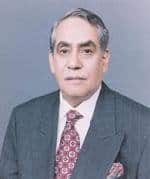Parveen Shakir Urdu poet
Parveen Shakir was born on 24th November, 1952 in Karachi, Pakistan. She was highly educated with two masters degrees, one in English literature and one in linguistics. She also held a Ph.D and another masters degree in Bank Administration.
She was a teacher for nine years before she joined the Civil Service and worked in the Customs department. In 1986 she was appointed the second secretary, CBR in Islamabad.
A number of books of her poetry have been published. In chronological order, they are Khushboo (1976), Sad-barg (1980), Khud-kalaami (1990), Inkaar (1990) and Maah-e-Tamaam (1994). Her first book, Khushboo, won the Adamjee award. Later she was awarded the Pride of Performance award, which is the highest award given by the Pakistan government.
On 26th December, 1994, on her way to work, her car collided with a truck and the world of modern Urdu poetry lost one of its brightest stars.
Parveen Shakir initially wrote under the pen-name of ‘Beena’. She considered Ahmed Nadeem Qasmi her ‘ustad’ and used to called him ‘Ammujaan’. She was married to Dr. Nasir Ahmed but got divorced from him sometime before her untimely demise in 1994.
Early career
Shakir started writing at a young age, penning both prose and poetry, and contributing columns in Urdu newspapers, and a few articles in English dailies. Initially, she wrote under the pen-name, “Beena”.Shakir held two masters degrees, one in English Literature and one in Linguistics. She also held a PhD and another masters degree in Bank Administration.
She was a teacher for nine years before she joined the Civil Service and worked in the Customs Department. In 1986 she was appointed the second secretary, CBR in Islamabad.
Style
Shakir employed mainly two forms of poetry in her work, one being the prevalent ghazal [plural: ghazalyaat], and the other being free verse. The most prominent themes in Shakir’s poetry are love, feminism, and social stigmas, though she occasionally wrote on other topics as well. Her work was often based on romanticism, exploring the concepts of love, beauty and their contradictions, and heavily integrated the use of metaphors, similes and personifications.
Arguably, Shakir can be termed the first poetess to use the word larki (girl) in her works—the male-dominated Urdu poetry scene seldom employs that word, and uses masculine syntax when talking about the ‘lover’. Similarly, she often made use of the Urdu first-person, feminine pronoun in her verses which, though extremely common in prose, was rarely used in poetry, even by female poetesses, before her
Ghazalyaat
Shakir’s ghazalyaat are considered “a combination of classical tradition with modern sensitivity”, and mainly deal with the feminine perspective on love and romance, and associated themes such as beauty, intimacy, separation, break-ups, distances, distrust and infidelity and disloyalty.
Most of Shakir’s ghazalyaat contain five to ten couplets, often – though not always – inter-related. Sometimes, two consecutive couplets may differ greatly in meaning and context [For example, in one of her works, the couplet ‘That girl, like her home, perhaps/ Fell victim to the flood is immediately followed by ‘I see light when I think of you/ Perhaps remembrance has become the moon’
Shakir’s ghazalyaat heavily rely on metaphors and similes, which are repeatedly and thought-provokingly used to bring force and lyricism in her work. A fine example of this is seen in one of her most famous couplets, “Wo tou khushbu hai, hawaon main bikhar jaye ga/ Masla phool ka hai, phool kidher jayega?”Translation: He is fragrance and would waft in the air/ the trouble lies with the flower – where shall the flower go? where Shakir relates ‘fragrance’ to an unfaithful lover, ‘air’ to the unfaithful person’s secret loves, and ‘flower’ to the person being cheated. Other metaphors Shakir commonly uses are titli for a Romeo, badal for one’s love, baarish for affection, and andhi for difficulties.
Some of Shakir’s ghazalyaat or, more specifically, couplets, have gained an iconic status in Urdu literature. One of her most famous couplets if the one given above. Another famous, Shakir couplet is “Jugnuu ko din kay wakt parakhne ki zid karain/ Bachchay hamaray ehed kay chalaak ho gaye”They insist upon evaluating the firefly in daylight/ The children of our age, have grown clever, which is often quoted to comment on the often surprising knowledge and awareness of the 21st century child.
Free verse
As compared to her ghazalyaat Shakir’s free verse is much bolder, and explores social issues and taboos, including gender inequality, discrimination, patriotism, deceit, prostitution, the human psyche, and current affairs. It is also much more modern and up-to-date.
Shakir is known for having employed the usage of pop culture references and English words and phrases, that have mixed up with Urdu, in her free verse – a practice that is both generally considered inappropriate, and criticized, in Urdu poetry. An example is the poem Departmental Store MeiN [In a Departmental Store], which is named thus despite the fact that there the term ‘departmental store’ could easily have been substituted with its Urdu equivalent, and where words like ‘natural pink,’ ‘hand lotion,’ ‘shade,’ ‘scent’ and ‘pack’ are brought into use, and references made to cosmetics brands like, Pearl, Revlon, Elizabeth Arden, and Tulip. Other examples are her poems Ecstasy, Nun and Picnic.
Personal life
Birth
Shakir was born on 24 November 1952 in Karachi,.
Education
Shakir was highly educated. She received two undergraduate degrees, one in English literature and the other in linguistics, and obtained MA degrees in the same subjects from the University of Karachi. She also held a PhD, and another MA degree in Bank Administration.
In 1982, Shakir qualified the Central Superior Services Examination. In 1991, she obtained an MA degree in Public Administration from Harvard University, USA.
Family, and death
Shakir married a Pakistani doctor, Naseer Ali, with whom she had a son, Syed Murad Ali—but the marriage did not last long and ended in a divorce.
On Dec 26th, 1994, Shakir’s car collided with a bus while she was on her way to work in Islamabad. The accident resulted in her death, a great loss to the Urdu poetry world.The road on which the accident took place is named after her.







